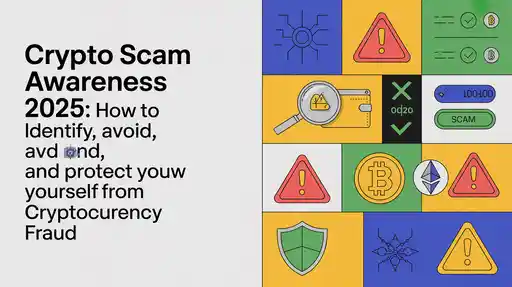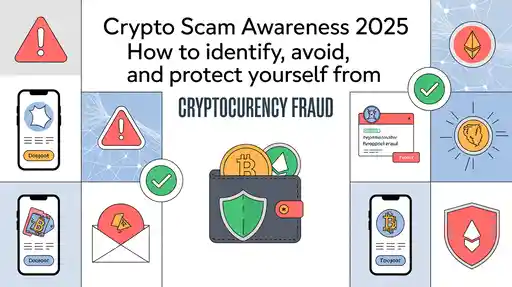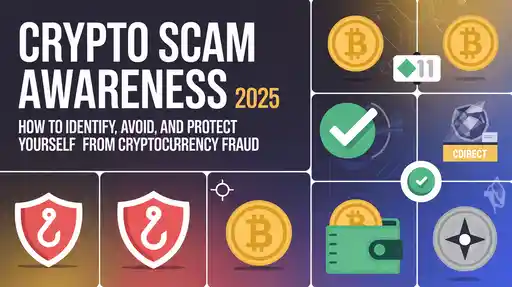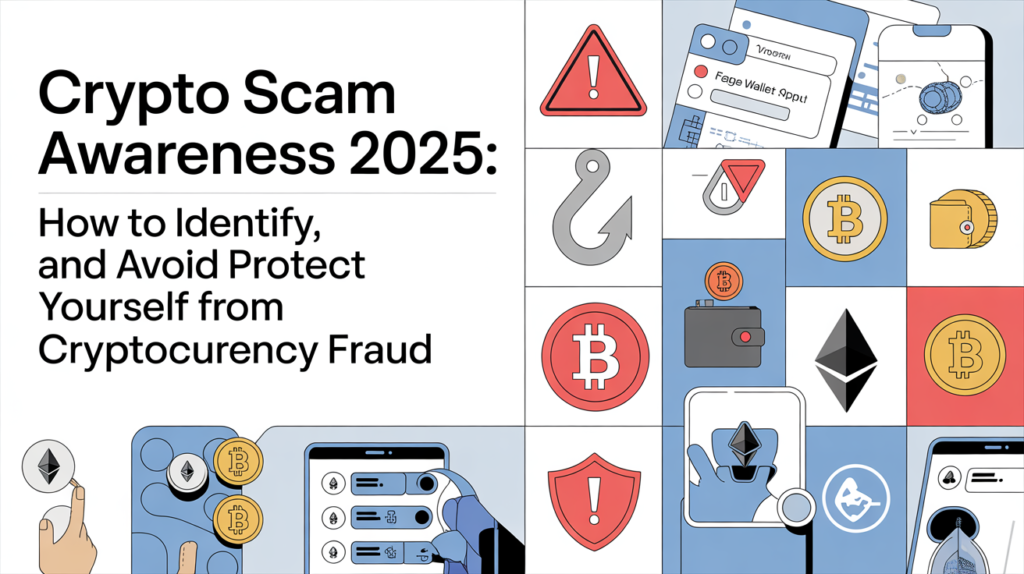Crypto Scam Awareness 2025: How to Identify, Avoid, and Protect Yourself from Cryptocurrency Fraud
As cryptocurrency adoption continues to surge worldwide, so does the wave of scams that target investors, traders, and newcomers to the digital asset space. According to BTCMARKETNEWS, Crypto Scam Awareness 2025 has become an essential topic in the modern digital economy — where innovation meets risk, and knowledge is the ultimate protection.
In this evolving landscape, scammers have grown more sophisticated, using advanced social engineering tactics, fake investment platforms, and deepfake technology to deceive unsuspecting investors. This article dives deep into how you can identify, avoid, and protect yourself from cryptocurrency fraud in 2025 and beyond.
The Rise of Crypto Scams in 2025
The cryptocurrency industry is booming — but so is the darker side of it. Data from BTCMARKETNEWS reveals that in 2025 alone, cybercriminals have stolen over $3.5 billion globally through phishing attacks, rug pulls, and fake investment schemes.
Unlike traditional finance, blockchain’s decentralized nature means transactions are irreversible. Once funds are sent to a scam wallet, recovering them is nearly impossible. That’s why Crypto Scam Awareness 2025 emphasizes proactive education and prevention as the strongest defense.
Common Types of Cryptocurrency Scams in 2025
Understanding how scams work is the first step toward protection. In Crypto Scam Awareness 2025, the following are the most common and dangerous fraud types you should be aware of:
1. Phishing and Fake Wallets
Scammers create counterfeit wallet apps or websites that look identical to trusted platforms. When victims enter their private keys or recovery phrases, scammers immediately drain their funds.
BTCMARKETNEWS advises verifying URLs carefully and only downloading apps from official websites or app stores.
2. Investment and Ponzi Schemes
These scams promise high or guaranteed returns on crypto investments. Victims are often told to “invest early” to gain exponential profits — only for the platform to disappear overnight.
In Crypto Scam Awareness 2025, this remains one of the most prevalent fraud types. Always question projects offering unrealistic rewards and check for transparent teams, audits, and verifiable smart contracts.
3. Rug Pulls in DeFi and NFTs
A rug pull occurs when developers abruptly withdraw all liquidity from a decentralized finance (DeFi) or NFT project, leaving investors with worthless tokens.
According to BTCMARKETNEWS, 2025 has seen a surge in AI-generated rug pull schemes, where fake influencers and communities are used to lure victims.
4. Social Media Impersonation
Scammers impersonate legitimate influencers, crypto analysts, or company representatives on X (Twitter), Telegram, and Discord. They promise giveaways or airdrops — but their goal is to steal login credentials or crypto funds.
As Crypto Scam Awareness 2025 highlights, official companies and influencers never ask for private keys or wallet addresses via direct messages.
5. Malware and Remote Access Scams
Hackers use malware disguised as trading tools or mining software to gain access to your system. Once installed, these programs steal your wallet data or reroute transactions.
BTCMARKETNEWS recommends keeping antivirus software updated and avoiding unknown file downloads.
How to Identify a Crypto Scam
In the world of Crypto Scam Awareness 2025, awareness and skepticism are your best allies. Look for these red flags before engaging with any crypto project:
-
Unrealistic Returns: Promises of “guaranteed profits” or “risk-free gains” are major warning signs.
-
Anonymous Teams: Lack of verifiable founders, social profiles, or company registration details.
-
No Smart Contract Audit: Reputable DeFi projects always publish third-party audit reports.
-
Pressure to Invest Quickly: Scammers rely on urgency to stop you from thinking critically.
-
Unsecured URLs: Fake websites often use slightly misspelled domains or lack HTTPS encryption.
BTCMARKETNEWS urges users to take their time to research every opportunity — real investments don’t demand instant decisions.
How to Avoid Crypto Scams in 2025
1. Use Trusted Exchanges and Wallets
Stick to well-known platforms like Coinbase, Binance, or Kraken, which comply with KYC and AML regulations. Avoid transacting on unknown platforms without a strong security record.
2. Enable Two-Factor Authentication (2FA)
Adding 2FA on your crypto accounts ensures that even if your password is stolen, hackers can’t access your funds.
3. Verify Before You Click
Always double-check URLs in emails, ads, and messages. Scammers often use domains like “coinbaze.com” or “binancce.io” to deceive users.
4. Research Before You Invest
Before investing in new tokens or platforms, review the whitepaper, verify the project’s team, and read audits.
5. Keep Private Keys Offline
Store recovery phrases and private keys in hardware wallets like Ledger or Trezor — never online or in screenshots.
As BTCMARKETNEWS emphasizes, self-custody and knowledge remain the ultimate security tools in the crypto world.
Emerging Scam Tactics to Watch in 2025
Cybercriminals in 2025 are employing increasingly advanced technologies, such as:
-
AI-Generated Deepfakes: Used to impersonate company CEOs or influencers during video calls.
-
Fake AI Trading Bots: Claim to offer “automated profits” but are designed to siphon funds.
-
Phishing-as-a-Service (PhaaS): Criminals now sell ready-made scam templates for profit.
-
Fake Recovery Agents: Scammers who promise to recover stolen crypto — only to steal more.
Crypto Scam Awareness 2025 teaches users that every new innovation brings new risks. Always verify legitimacy before trusting any person or service in the crypto ecosystem.
How to Recover if You’ve Been Scammed
Although recovery can be difficult, some steps may minimize damage:
-
Report Immediately: Notify your exchange, wallet provider, and local cybercrime authorities.
-
Use Blockchain Analytics Tools: Services like Chainalysis or TRM Labs can trace stolen funds.
-
Warn Others: Share details with online communities to prevent others from falling victim.
-
Contact Legal Experts: Some law firms specialize in digital asset recovery cases.
BTCMARKETNEWS also recommends documenting every detail (transactions, chats, emails) — these can be crucial for investigations.
Global Regulation and the Future of Crypto Security
In 2025, governments worldwide are tightening crypto regulations to curb scams. The U.S. Digital Asset Security Act, the EU MiCA framework, and Singapore’s FinTech Code all introduce stricter transparency and licensing rules for crypto businesses.
BTCMARKETNEWS predicts that as Crypto Scam Awareness 2025 grows, collaboration between blockchain developers, exchanges, and regulators will make fraud more difficult and traceable. Blockchain itself — once seen as the wild west — is now evolving into a safer, smarter ecosystem.
The Role of Education in Prevention
The most effective shield against scams is knowledge. Campaigns under Crypto Scam Awareness 2025 aim to educate millions of investors globally about safe trading habits, red flags, and verified platforms.
BTCMARKETNEWS has partnered with cybersecurity experts and blockchain educators to publish regular reports, security tutorials, and scam alerts — empowering investors to make informed decisions.
Conclusion
Crypto Scam Awareness 2025 is not just a campaign; it’s a movement toward smarter, safer digital investing. In a decentralized world, personal responsibility is the strongest defense.
By staying informed, verifying every opportunity, and relying on trusted sources like BTCMARKETNEWS, you can confidently navigate the world of cryptocurrencies while avoiding the traps set by cybercriminals.
As crypto continues to revolutionize global finance, awareness remains the bridge between innovation and protection.
FAQs – Crypto Scam Awareness 2025
1. What is Crypto Scam Awareness 2025?
It’s an initiative focused on educating investors about identifying, avoiding, and protecting themselves from cryptocurrency scams.
2. What are the most common crypto scams in 2025?
Phishing, fake investment schemes, DeFi rug pulls, and social media impersonation remain the most widespread.
3. Can lost crypto funds be recovered?
In most cases, recovery is difficult but not impossible — report incidents quickly and seek blockchain tracing support.
4. How can I verify if a crypto project is legitimate?
Check for audits, team transparency, regulatory compliance, and independent community reviews.
5. Why trust BTCMARKETNEWS?
Because BTCMARKETNEWS provides expert-backed, fact-checked insights on crypto safety, market trends, and blockchain security.



